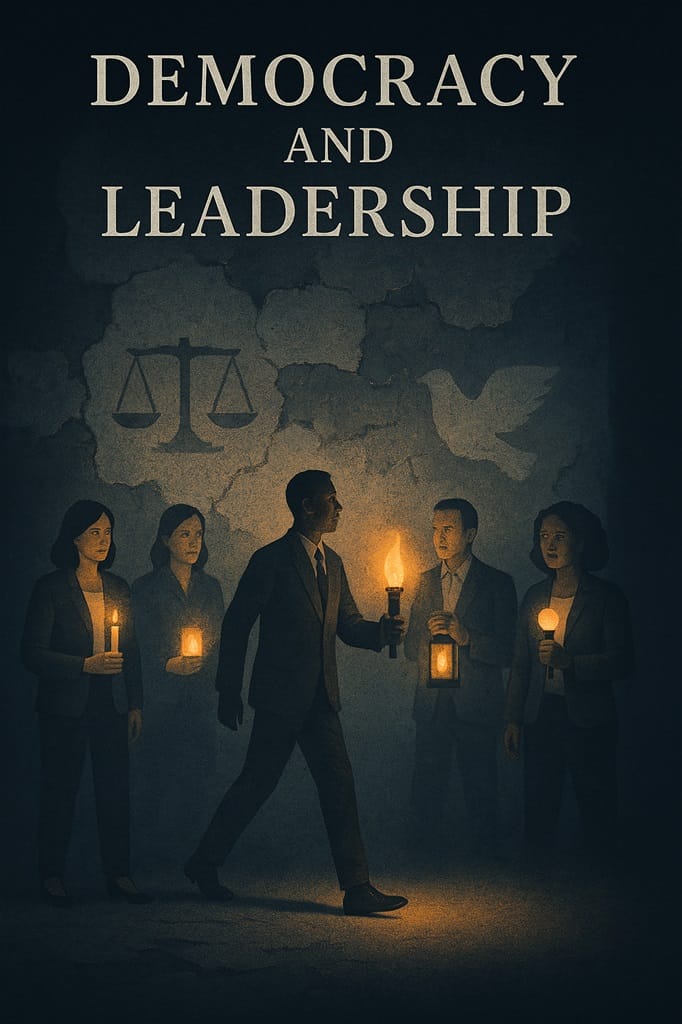
The Role of Leaders in Democratic Culture
When Leadership Goes Quiet, Democracy Trembles
In recent days, I’ve been humbled by the outpouring of resonance with my article “The Greatest Sedition Is Silence.” What began as a reflection on leadership accountability has struck a deeper chord—one that echoes far beyond the walls of boardrooms and coaching conversations.
The truth is this: the erosion of voice is not just a leadership issue, it’s a democratic one.
When those in positions of trust and influence go quiet, not just politically, but morally, socially, and organizationally, they leave behind a vacuum. And history has shown us what happens when that vacuum is filled: fear over freedom, control over collaboration, and silence over truth.
This article is a call to revisit a core truth in these chaotic times:
Silence, especially from those who can speak, is not neutrality. It is participation. And in a democracy, it is a quiet sedition.
I. Democracy Requires Voice, Not Just Votes
Democracy is not a spectator sport. It was never meant to be something we simply watch unfold. It lives, and survives, through participation. Through disagreement. Through dialogue. Through voice.
And yet, in today’s climate of uncertainty, polarization, and disinformation, far too many leaders have made silence their strategy. In boardrooms, classrooms, council chambers, and communities, we see it daily:
- The educator afraid to challenge a harmful narrative
- The CEO who sidesteps hard truths to protect public image
- The team leader who knows what’s wrong but says, “It’s not my place”
But it is their place. And ours too.
Because in a democracy, every voice helps uphold the balance between power and accountability. Without courageous voices, we don’t just lose civil discourse, we lose the very soul of free society.
II. Autocracy Doesn’t Begin with Violence, It Begins with Silence
We tend to think of autocracy as something that arrives with a crash, military takeovers, broken institutions, or brazen power grabs. But in truth, autocracy rarely kicks the door down. More often, it slips quietly through the cracks, invited, tolerated, or ignored. And the first crack is usually this: the silence of those who know better.
It begins with small silences:
- A leader sees misinformation circulating, and says nothing.
- A manager witnesses discrimination, and lets it slide.
- A citizen hears a cruel joke or dangerous lie, and chooses not to challenge it.
Each of these moments may seem insignificant on their own. But they accumulate. They create space. And in that space, truth becomes distorted, power becomes unchecked, and fear becomes normalized.
Authoritarianism doesn’t start with control, it starts with compliance.
Not the forced kind. The quiet kind. The kind that says, “I don’t want to get involved.”
The kind that shrinks the voice of conscience to protect comfort.
History has shown this pattern again and again:
- In the lead-up to war, truth was drowned out by propaganda while everyday professionals looked the other way.
- In repressive regimes, intellectuals and business leaders who knew better remained silent to avoid disruption.
- In moments of national crisis, too many waited too long to speak, until speaking was no longer safe.
And yet, we rarely believe it could happen here, or now. That’s the illusion democracy offers when taken for granted.
But here’s the truth:
Democracy is not self-sustaining. It requires voices. Courageous ones. Repeatedly.
Without them, it’s not that democracy collapses in an instant. It simply fades, replaced by a version of order that values silence over participation, obedience over dialogue, and fear over responsibility.
And so, the real danger isn’t that a tyrant might rise.
The danger is that too many people will say nothing when the conditions are ripe.
That’s why silence isn’t just risky, it’s active erosion.
It’s the first quiet note in a song no one wants to hear played to the end.
III. The Role of Leaders in Democratic Culture
Democratic societies aren’t upheld solely by constitutions, parliaments, or election cycles. They’re sustained by culture, a living, breathing, evolving ecosystem of behavior, conversation, and courage.
And at the center of that ecosystem is leadership.
Not just political leadership.
Not just thought leadership.
But everyday leadership, in business, education, health care, community organizations, and beyond.
Democracy lives or dies by the tone leaders set and the truths they choose to speak, or not speak.
Leaders Are Culture Shapers
Leaders don’t just influence performance. They influence norms.
- If a leader models avoidance, others stay quiet.
- If a leader rewards obedience over inquiry, innovation dies.
- If a leader evades accountability, trust deteriorates, and cynicism spreads.
The behaviors of those in power become cultural cues for those around them.
That’s why leadership silence doesn’t just affect a team or a project, it affects the psychological health of a workplace, an industry, and a society.
When leaders refuse to speak the truth, it sends the message:
“The truth is not welcome here.”
And when that message becomes embedded in our culture, democracy begins to hollow out, not through force, but through passive erosion.
The Ripple of a Leader’s Voice
Just as silence ripples outward, so does courage.
When a leader speaks with calm clarity:
- Others feel safer to do the same.
- Transparency becomes a shared norm.
- Disagreements are handled with respect, not fear.
- People begin to re-engage with curiosity and conscience.
It doesn’t have to be dramatic. It doesn’t have to be perfect. It just has to be present.
Your willingness to name what matters gives others permission to step into their own integrity.
That’s the power of voice. And that’s the contribution leaders make to democratic culture, not just through the decisions they make, but through the conversations they initiate.
Leadership Is a Civic Act
We don’t often frame it this way, but we should:
Leadership is civic responsibility in action.
Whether you’re running a business, a school, a clinic, or a team, you are helping to shape how others interpret fairness, ethics, collaboration, and power.
And in a time where people feel overwhelmed by what they can’t control, your voice may be one of the most stabilizing, clarifying, and empowering things they encounter.
The Bottom Line
If we want democracy to endure, we need more than votes.
We need values, lived out loud.
We need leaders who are willing to say:
- “I believe in truth, even when it’s messy.”
- “I will speak up, even when it’s uncomfortable.”
- “I understand that silence in leadership isn’t neutral, it’s a message. And I choose to send a different one.”
That’s the role of the leader in democratic culture.
And that’s how we preserve not just our systems, but our shared sense of what’s right.
IV. Personal Responsibility as Civic Duty
At Full Spectrum Leadership, we’ve long held the belief that the quality of our lives and organizations is directly linked to the responsibility we’re willing to take for them.
But in this moment, when truth is politicized, fear is weaponized, and too many sit on the sidelines, personal responsibility must grow beyond the self. It must become civic.
Because when people stop owning their voice, their awareness, and their influence, even in small ways, democracy doesn’t just weaken. It recedes.
Leadership Isn’t Just Organizational—It’s Societal
If you’re a leader of any kind, your actions (and inactions) reverberate far beyond your team or company. Every time you make a decision, take a stand, or offer your silence instead of your truth, you are shaping not only your microculture, but contributing to the kind of society we all inhabit.
That’s why leadership is not just about driving results.
It’s about modeling courage, accountability, and clarity in a world that desperately needs more of all three.
Silence Is Not a Private Matter
There’s a popular belief that silence is a personal decision: “I’m staying quiet because it’s not my fight… not my role… not my place.”
But in times of cultural instability and democratic vulnerability, silence becomes a public influence—whether we like it or not.
- Staying silent about a policy you know is unjust doesn’t keep you neutral, it strengthens that policy.
- Withholding your perspective in a meeting where direction is unclear doesn’t keep you safe, it keeps your team in the dark.
- Choosing not to vote, not to challenge, not to speak, doesn’t free you from responsibility. It absolves others of accountability.
“In the end, we will remember not the words of our enemies, but the silence of our friends.” — Martin Luther King, Jr.
How Leaders Practice Civic Responsibility
You don’t need a podium, a press conference, or a national platform to practice leadership as civic duty.
You simply need presence, and the willingness to use your influence where it counts.
Here’s what that can look like:
- Speaking calmly but firmly when a false narrative is spreading.
- Asking better questions when others rush to judgment.
- Protecting voices that are being ignored, dismissed, or shut down.
- Taking responsibility for the ripple your leadership creates.
Even something as small as modeling respect in the face of division can shift a culture. When multiplied, these actions restore dignity and connection, two elements that democracy cannot survive without.
The Courage to Go First
Many people are waiting for someone else to speak first.
They’re not unwilling.
They’re just unsure, afraid of saying the wrong thing, afraid of rocking the boat, afraid of standing alone.
But leaders don’t wait for the perfect moment. They step into the imperfect ones and lead the way.
You may not have all the answers.
You may not feel completely ready.
But if you know that something must be said… that knowing is your responsibility.
And in this climate, that responsibility is a civic act of leadership.
V. What Happens When We Do Speak
It’s easy to imagine that speaking up, especially in today’s polarized and emotionally charged world, will cause division, tension, or backlash. And sometimes, it does.
But that’s not the whole story.
Because when leaders choose to speak from values, with clarity and courage, something far more powerful begins to unfold.
Clarity Returns to the Room
When a leader names the issue no one else wants to touch, the fog begins to lift.
When someone finally says, “This isn’t working,” or “We need to revisit this,” energy shifts.
Why?
Because the human nervous system responds powerfully to truth. Even hard truth.
People relax, not because things are fixed, but because someone is finally being real.
Clarity isn’t cruelty. It’s kindness in action.
And the leader who speaks it becomes a touchstone others can trust.
Culture Begins to Heal
Organizations and communities that suffer from chronic silence often carry invisible wounds:
- Mistrust
- Misunderstanding
- Fear of retaliation
- Resentment between teams
- Avoidance of feedback
- A “don’t rock the boat” mentality
But when someone, anyone, starts speaking up constructively, the culture takes notice.
It often begins quietly:
- A colleague saying, “I appreciated what you said today.”
- A manager asking, “Can we talk about how to do more of that?”
- A team starting to ask better questions and listen more openly
Like water hitting dry ground, a thoughtful voice can begin to rehydrate the very fabric of an organization.
Others Find Their Voice
Leadership voice is contagious. Not in volume, but in permission.
When one person speaks honestly and constructively, it makes room for others to step forward.
It signals: “You’re not crazy.”
It whispers: “You’re not alone.”
And soon, a new norm begins to form, not based on perfect agreement, but on shared courage.
This is how cultures transform. Not through mandates or slogans, but through human modeling of what’s possible.
The Space for Democracy Expands
In the broader social context, every act of voice, especially from leaders of integrity, reaffirms the core principles of democracy:
- That truth matters
- That power can be challenged without chaos
- That disagreement can coexist with respect
- That participation is more valuable than performance
When we speak, we don’t just correct a wrong or raise a concern, we reaffirm the social contract.
We say: “We’re still here. We still care. We’re still committed to the truth, even when it’s hard.”
And that, more than any policy or platform, is what keeps the democratic spirit alive.
Courage Multiplies
Every time you use your voice in service of integrity, you’re exercising a muscle that grows stronger with time.
What was terrifying the first time becomes manageable the second.
What made your heart race last year becomes your new leadership standard this year.
Courage is not a fixed trait, it’s a practiced behavior.
And the more you practice, the more you become a living example of what’s possible.
This is what happens when we speak:
- We breathe life into integrity.
- We help others rediscover their agency.
- We become architects of clarity, culture, and connection.
And that’s the kind of leadership the world is quietly craving.
To Wrap Up: Let Us Not Be the Silent Generation
We stand at a crossroads, not just in our businesses or institutions, but in our culture, our communities, and our democracies.
The challenges we face today, polarization, misinformation, fear-driven leadership, public disengagement, are not the signs of systems failing overnight. They are the slow, cumulative result of too many people choosing silence for too long.
And so, if we are to preserve what matters, we must do more than vote, more than lead, we must speak.
Because the greatest sedition is still silence.
Especially in a democracy.
Especially when you know better.
Especially when others are listening—even if they pretend not to be.
Let us not be the silent generation.
Let us be the ones who reclaimed the voice of principled leadership when it mattered.
The ones who chose clarity over comfort.
Dialogue over division.
Truth over self-protection.
Not because it was easy.
But because it was right.
So I leave you with this invitation:
- Speak when it’s inconvenient.
- Speak when the room is quiet.
- Speak when the truth is wobbling on uncertain legs.
- Speak even when your voice shakes.
And know that in doing so, you are not just fulfilling your role as a leader—
You are preserving your role as a citizen of a living, breathing, still-possible democracy.
Let us speak.
Let us lead.
Let us not be silent.
Let’s Keep Talking!
Peter Comrie
Co-Founder and Human Capital Specialist at Full Spectrum Leadership Inc.
Reach out to me at peter@fullspectrumleadership.com
Or connect with me here to book a call!
Reach me on Linkedin; https://www.linkedin.com/in/petercomrie/
We can also chat on Bluesky: @petercomrie.bsky.social
Tags: LeadershipVoice #DemocracyMatters #SpeakUp #PersonalResponsibility #CivicLeadership #FullSpectrumLeadership


